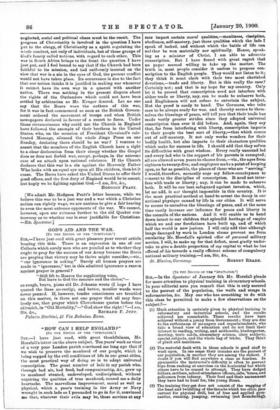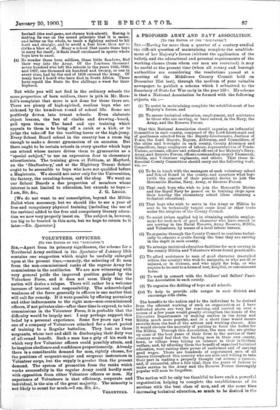[TO THE EDIPOR OF THE "SPECTATOR."]
SIR,—In the Spectator of January 6th Mr. Horafall pleads for more attention to physical training in elementary schools. In your editorial note you remark that this is only secured to the poorest of the population, the waifs and strays in reformatories, &c. May one who has something to do with this class be permitted to make a few observations on the
subject ?—
(1) Much attention is certainly given to physical training in reformatory and industrial schools, and the results achieved are remarkable. These results have been achieved without a penny from Government ; they are due to the enthusiasm of managers and superintendents, who take a broad view of education and do not limit their interest to reading, writing, and arithmetic, kindergarten, drawing, tonic sol-fa, elementary science, class subjects, special subjects, and the whole bag of tricks. They think of pluck and manliness.
(2) The material dealt with in these schools is good stuff to work upon. In one sense their inmates are the poorest of our population, in another they are among the richest. I doubt if you will find anywhere a class so fearless. In gymnastics the instructor's difficulty is often to prevent boys from rushing at exercises on the horizontal bar which others have to be coaxed to attempt. They have dodged fathers, mothers, school-attendance officers, cabs, 'buses, and policemen from infancy. Their food and their amusement they have had to hunt for, like young Boers.
The training they get does not consist of the wagging of the head and twiddling of the thumbs which too often pass current for physical drill, but of free and applied gym- nastics, running, jumping, swimming (not floundering),
(8) football (the real game, not clumsy kick-about). Boxing is making its way on the sound principle that it is easier, and better on the whole, to teach a fighting animal to hit hard and straigh r, and to avoid a foul blow, than not to strike a blow at ell, Many a school that meets these boys is sorry for itself; it finds itself outclassed in sports where boys love to excel.
(4) No wonder these born soldiers, these little Sandowa, find their way into the Army. Of the fourteen thousand seven hundred who left the schools in the years 1895,1896, and 1897, one thousand six hundred and twenty, or one in every nine, had by the end of 1898 entered the Army. Of many have I heard who have died in South Africa. These have repaid the State its five shillings a week for their boyhood.
But while you will not find in the ordinary schools the same proportion of born soldiers, there is pith in Mr. Hors-
fall's complaint that more is not done for those there are. There are plenty of high-spirited, restless boys who are
sickened by the humdrum round of school life. Some are positively driven into truant schools. Even elaborate object lessons, the box of chalks and drawing - board, pall upon them. The hand and eye training which appeals to them is to bring off a catch or a kick, or to judge the take-off for the vaulting-horse or the high-jump. Every School Board school in the country has a room big enough to make a decent gymnasium of on occasion. But there ought to be certain schools in every quarter which boys can attend whose nature drives them to gymnastics as a "special subject," to use an expression dear to elementary educationists. The training given at Feltham, at hIayford, on the • Shaftesbury,' and at the Highbury Truant School ought to be accessible to boys who have not qualified before a Magistrate. We should not cater only for the Universities, the factory, the counting-house, and the shop. We want on our School Boards a due proportion of members whose interest is not limited to education, but extends to boys.—
I am, Sir, &c., J. G. LEGGE.
[We do not want to see- conscription, beyond the Militia Ballot when necessary, but we should like to see a year of free and compulsory physical training (including the use of the carbine) added to the free and compulsory literary educa- tion we now very properly insist on. The subject is, however, too big to be treated in this note, but we hope to return to it later.—ED. Spectator.]







































 Previous page
Previous page